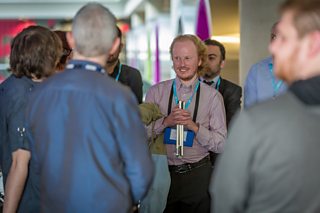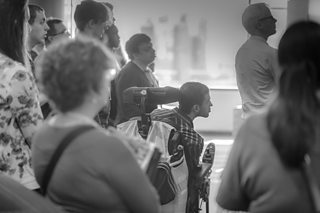ΒιΆΉΤΌΕΔ Digital and the UN International Day of People with Disabilities
Toby Mildon
Diversity and Inclusion Manager
Each year on December 3rd, the UN marks the International Day of People with Disabilities. In the UK alone, there are 11 million people living with a disability and 16% of those people are of working age. Toby Mildon, ΒιΆΉΤΌΕΔ Digital's Diversity and Inclusion Manager, explains the work being undertaken to support people with disabilities within the division.
Many people living with disabilities want to lead a “normal life”, including working for a living. A person with a disability has more chance of being hired now than in 2002, but social stigmatisation still exists and they still have challenges within the workplace. A person with disabilities is more likely to have to deal with unfair treatment at work than those without disability. They also experience difficulties outside of work; for example facing inaccessible public transportation to actually get to their workplace in the first place.

Nonetheless, some of the most notable people who have played a huge part in shaping technology had a disability. Alexander Graham Bell, credited with patenting the first practical telephone, is belived to have had a learning disability and experts have suggested that Albert Einstein was on the Autism Spectrum. Stephen Hawking has helped turn science fiction into reality while living with ALS, using a wheelchair to get around and using a computer to communicate. These famous examples, and many others like them, highlight through their work the inaccuracies and misconceptions surrounding disabilities.
Now that you know a little bit more background, I hope you can understand the importance of the UN International Day of People with Disabilities. The day was created in 1992 to help spread awareness and acceptance for those living with disabilities. In my opinion, businesses should mark this day to help support everyone in their community and the diverse customers they serve, regardless of disability.
ΒιΆΉΤΌΕΔ Digital is very aware of its responsibility to its audience. We need to reflect the make-up of modern Britain in all its diversity. This is why we’re investing in employing and developing disabled employees:
- We’ve hosted several disabled in tech conferences whereby attendees with skillsets such as software engineering and UX design can learn about our careers, working life, sharpen skills in masterclasses and meet hiring managers. As a result of attending our last disability in technology event, two attendees are now working for us in Digital. and there is still time to sign-up and come along.
- We hosted an intern in our Mobile Platform team in Salford, through the .
- We’ve put the majority of our senior leadership team and top hiring managers through 'Unconscious Bias' training.
- We’re rolling out 'Being a Disability Smart Manager' training to line managers to discuss such topics as inclusive leadership, overcoming the awkward (to coin ) and remind them of existing services like our Access Unit, disabled staff forum, accessible IT and neurodiversity project.
- We conducted a trial of blind auditioning with GapJumpers whereby job applicants can anonymously demonstrate the skills needed for a job in question, as opposed to CV screening, which can be subject to biases.
- We’ll be releasing a series of short comedy sketches to educate our staff about diversity and inclusion covering issues like stereotyping, micro-inequities, bias, discrimination, values and beliefs.

As a person living with a neuromuscular disability myself, I am very proud to work for the ΒιΆΉΤΌΕΔ in educating, informing and entertaining the Nation. I’m here not because of my disability, but the skills and contributions I make to the corporation. The manager that hired me could see this in me and wasn’t blindsided by my wheelchair, which I experienced in so many other job interviews.
Now as D&I Lead in ΒιΆΉΤΌΕΔ Digital I’m finding ways of getting more disabled people working within our industry, so we can best serve the diverse breadth of the UK population. This can only happen if everyone helps reduce the barriers that disabled people face in gaining employment, which is why December 3rd is a good reminder of all our responsibilities.
